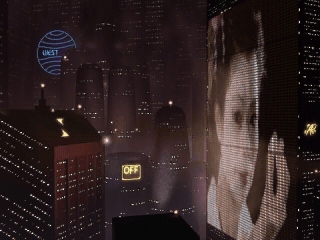Green Tomorrows
 Opportunity Green arrives on Saturday, presenting an impressive line-up of sustainable business leaders, green bloggers, environmental policy experts, and at least one eco-futurist. I am humbled and honored that they've asked me to present the opening keynote for the event. That talk -- "Green Tomorrows" -- will give me an opportunity to describe the different kinds of futures our environmental choices can produce.
Opportunity Green arrives on Saturday, presenting an impressive line-up of sustainable business leaders, green bloggers, environmental policy experts, and at least one eco-futurist. I am humbled and honored that they've asked me to present the opening keynote for the event. That talk -- "Green Tomorrows" -- will give me an opportunity to describe the different kinds of futures our environmental choices can produce.
The conference takes place in Los Angeles, which may not be at the top of the list of most-sustainable cities. But when Green LA Girl Siel asked me to talk a bit about what could make LA's green future unique, I gave her this reply (which she printed in full in her blog at the LA Times):
Los Angeles is a city built on competing visions of the future.On the surface, LA seems to be the realization of all of the leading environmental risks: the auto-centric culture; the suburban sprawl; the overburdened water table; the celebration of all things consumer, from media to merchandise. There's truth to this caricature, unfortunately. And while these environmental burdens could once be seen as persistent annoyances, they're now nothing less than engines for catastrophe.
At the same time, LA embraces constant reinvention. The immigrants passing through, both from outside the U.S. and -- even more often -- from other American states, churn the culture, the economy and the society of Los Angeles in ways that would be hard to replicate anywhere else. With them come new ideas, and the desire for a space to see the ideas flourish. The media industry is itself founded on the notion of creative destruction, entrepreneurial cycles accelerated a hundred-fold; and while the media companies themselves may sometimes forget this underlying truth, and instead seek the comforts of stagnant incumbency, the thousands upon thousands of creative people working in and supporting the industry live the life of creative destruction every day.
Fortunately, Los Angeles doesn't ignore the environmental challenges it faces, and the number of organizations and companies looking for ways to handle these dilemmas is staggering. The solutions won't be simple, and won't be cheap, but will -- if and when they arise -- be globally transformative. If they can work in Los Angeles they can work nearly anywhere, especially in the explosive cities of the developing world. Lessons (and innovations!) from Los Angeles are far more likely to be applicable in Beijing or Bangalore than would techniques copied from Portland or New York.
The quandary that Los Angeles faces, then, is whether to see the environmental risks as the leading driver for innovation and reinvention, or to allow them to turn the megalopolis into the first big failed city-state of the 21st century.
Let me re-emphasize the (buried) point: Los Angeles, with its sprawling, polycephalous geography, overloaded resources and ecological services, chaotic infrastructure, legendary (if a helluva lot better than when I was a kid living there) pollution, and struggles to get out from under decades of bad planning, has the potential to be a model for developing megacities around the world. Despite its many challenges, Los Angeles has the capacity to be experimental, and to iterate its way to a greener future. In doing so, it will allow the world's megacities to follow in its footsteps.
If LA becomes a reasonably sustainable megalopolis, it's a strong indicator that we'll be able to make it through this global crisis with our civilization intact.
(Image from Blade Runner, set in 2012 Los Angeles, in a most decidedly un-green tomorrow.)






Comments
It's really a stretch for me to picture LA undergoing the drastic rezoning and construction this would require.
Posted by: Howard Berkey | November 13, 2007 11:12 PM
Not that I wouldn't love to see it, of course.
Posted by: Howard Berkey | November 14, 2007 11:37 AM
A provocative thought, Jamais, that LA's capacity for invention could outpace its capacity for denial. A hope worth cultivating. Re Blade Runner, the film's set in 02019 Los Angeles rather than 02012 (so, uh, it could still happen that way, right?) I believe the PKD story was originally set in 01992, changed in later publications to 02021.
Posted by: Stuart Candy | November 14, 2007 12:21 PM
Looking forward to seeing you Saturday :)
Posted by: Siel | November 15, 2007 6:10 PM